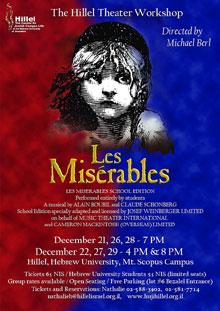"It's a hell of a lot of fun," says Fred Casden, a cast member in productions staged in Jerusalem by
Encore Educational Theater Company, one of several English-language community theater troupes in Israel. Casden, 70, moved to Israel from New Jersey four years ago. "I never did amateur theater in the States," he says. "When you come here, you are in effect reinventing yourself to a certain extent, so options you don't think about in your old persona are now possible because you have a new persona."
Rafi Poch, a Toronto native who started the still-active
Bar Ilan Acting Society at
Bar-Ilan University before graduating in 2007, says many Israelis enjoy the productions along with North American, British, South African and Australian ex-pats. "It's Western culture that Israel is endeavoring to explore, so when you put that together with the fact that people enjoy seeing a play in its original language, there is a large demand for this," says Poch.
"When we put on 'Shakespeare in the Park' this summer, we were worried we wouldn't sell enough tickets because we expanded to six shows from two the year before. Well, it turns out we had a minimum audience of 200 at each show."
Stage One, a spring festival in Jerusalem highlighting English amateur theater in Israel, last year put on 12 shows for more than 1,500 people over two days, and this year is planning on 15. The festival runs during Passover, when the capital city is full of tourists from English-speaking countries. "Hebrew professional groups want to participate in English, too, and we have seven proposals from groups abroad," says Poch, one of the festival's directors. "It's turning into a worldwide phenomenon."
Musicals, Gilbert & Sullivan

Poster advertising the Hillel Theater
Workshop's production of "Les Misérables" |
Musicals are especially popular among English-speaking audiences.
Tel Aviv Community Theatre (TACT), Israel's oldest English-language troupe, is staging the original play "Happy Hour" this winter, described as a bittersweet musical drama set in a New York bar.
Israel Musicals, based in Jerusalem, is offering "Truly Scrumptious," "Cats" and "Frankly, Sinatra" this winter. The first show is a collaboration with
JEST (Jerusalem English Speaking Theatre), which has staged plays by George Bernard Shaw, Oscar Wilde, Noel Coward, Arthur Miller and Neil Simon since 1985, along with children's productions and musicals including "Annie," "South Pacific" and "Camelot."
The Beersheva-based
Light Opera Group of the Negev (LOGON) is presenting "Oliver!" in February and March 2012, and its two previous shows were "South Pacific" and "My Fair Lady." Founded in 1981 as a Gilbert & Sullivan troupe that performed in cities across Israel, in 1996 LOGON switched from comic light opera to Broadway musicals, starting with "Fiddler on the Roof."
Encore has taken over as the Israeli specialist in Gilbert & Sullivan. It presented the "HMS Pinafore" in December and January on its home stage at Hirsch Auditorium in Jerusalem, as well as in Ra'anana and Zichron Ya'acov. The play featured a cast of 45, a live orchestra, full sets and elaborate costumes.
"HMS Pinafore" cast members from left, Michael Ben-Eliezer, Jake Halperin and Amitai Rosenberg
(Photo by Brian Negin)
"People in this country are desperate for light entertainment that's literate and witty, as a release from the tension of everyday life," says Robert Binder, Encore's director. "They're eager to attend something that reminds them of the culture where they came from, and that offers a valid alternative to Hebrew-language productions if their language skills aren't good enough. But Hebrew speakers also come because of the quality in music, staging and production."
In February 1984, shortly after moving to Israel, Binder founded the Gilbert & Sullivan Society, an appreciation group that sometimes staged modest parlor productions for charity. "In 2000, when maestro Paul Salter made aliyah from Manchester, we were able to expand our scale," he says. The company was part of JEST for a few years and then struck out as an independent, not-for-profit community theater in 2006.